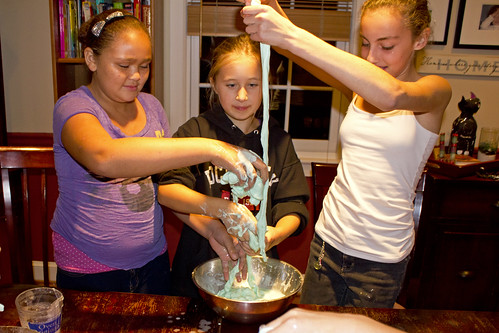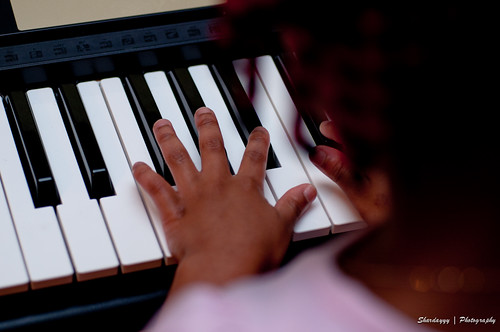It’s not learning, it’s having learned

Harry Potter slime party image by woodleywonderworks (slime recipe)
If you can’t detect a pulse in your homeschool, it’s time to get your heart pumping again. There’s no shame in finding yourself exhausted or bored. These are ordinary experiences in any long-term activity. The idea isn’t to make yourself feel better by pretending, or to explain away the lost enthusiasm, or to judge yourself for the natural result of hard work and commitment. We get nowhere when we heap blame and shame on ourselves.
I’ve urged parents to consider the idea that their investment in home education ought to exceed their children’s output. When I did so, I did not have in mind that the parent would necessarily sit side-by-side with a 16 year old pointing to the next Algebra 2 problem on the page to ensure that it gets done (though truth be told, I did do that for one of my kids because he needed it at the time). Still, that is not the vision I had in mind.
The concept to consider is this one:
Your homeschool depends on what you, the parent, brings to it.
Let’s take a look at what you can bring that will create/foster learning. Then let’s take a look at what you can do for yourself to prevent exasperation, fatigue, and disillusionment with the whole project (we’ll cover the second one in an additional post.)
To foster an environment for learning means that you, yourself, have a sense of what generates learning to begin with! Textbooks don’t do it. Workbooks don’t do it. Heck, even some teachers and tutors and classes don’t do it. Learning is not imposed from external sources, though external sources can facilitate learning.
Learning is an internal experience that comes from connecting to the ideas presented and making them your own. The concepts, practices, ideas, systems, facts, and stories are taken in through any number of means (lectures, DVDs, workbooks, classes, YouTube videos, conversations, cartoons, the Kahn Academy, reading, your local public school, self-teaching through following the rabbit trail of your own interest, a library, the Internet, hearing about the topic from your best friend, trying it yourself, practice, using whatever it is in ‘real’ life…). You get the idea.
Learning is what happens to human beings who are engaged with life. Intentional learning (where you set out to master X set of concepts or books or musical pieces or dance steps…) happens when a learner takes responsibility to follow through on a course of study using any one of those means suggested above. Sometimes intentional learning is supported by accountability structures (weekly piano lesson, tests, narrations, due dates and deadlines, competitions, attempts to be published, co-op classes, a promise to mom, rehearsals, performances, traditional school). Sometimes intentional learning is not structured or monitored and it happens at the pace and enthusiasm level of the learner.
The key to a happy homeschool is the experience of satisfying progress in learning. Kids and parents need to know that together they are in a context of stimulating discovery, that satisfies the child’s need for two things:
1) challenge to grow, and
2) comfort at having mastered or achieved.
Parents often measure learning by challenge (how much effort the attempt to learn requires) and see mastery as an “end point” to be acknowledged, but then to move on to the next challenge.
We all like to be challenged to grow (that’s what drives us forward in life). But an equally important part of growth is enjoying the fruits of having learned—it is the act of using what has been gained that solidifies “the thing” as a person’s own possession. It feels incredible to use skills that are mastered before moving onto the next challenge. Too often in homeschool we forget to revel in “having learned.” We forget to indulge the desire to do what feels easy and natural, for a good bit, before hurrying off to “long division” or the next unfamiliar historical period, or from an easy musical piece to Beethoven, or from readers to chapter books.

Image by Shardayyy
Just because your child is over the hump with manuscript writing doesn’t mean she needs to immediately plunge into cursive. Enjoy manuscript. Get tools that enhance the experience (different styles of manuscript, make place cards, decorate photo pages with captions). Really enjoy the skillful use of manuscript without any demand to “grow again.”
If your homeschool feels strained, it could be that too much emphasis is being put on “next, next, next” and you haven’t sufficiently enjoyed “having achieved.” One way to regain the pleasure of home education is to spend a week (a month!) simply recounting and using the skills mastered. What would happen, for instance, if after mastering the multiplication tables, you found dozens of ways to use them?
You, the parent, could find games online, you could set up a scavenger hunt where the clues are revealed after answering a multiplication fact, your children could create times table pages that are decorated and laminated, you could go through your house looking for all the games that can be played using multiplication and then stack them up and play them!
For a week long period, each time you and the kids find a use for multiplication, toss nickels, dimes, and quarters into a jar, and at the end, you could sort them and then multiply the number of coins by the coinage value to see how much money you collected.
The possibilities are endless, but they need to be created by you. This is what I mean by your investment. This is how you partner with your kids.
Your kids won’t think of ways to reinforce their learning on their own (necessarily—though sometimes they do and we might be the ones to shut them down saying, “We already did that. It’s time to do x, y, and z”). Heck, you may find it rough to think of creative ideas on your own. That’s why we have each other and the oh-so-awesome Internets (ha!) to aid us! We want to get beyond the endless drive, push, press, complete, move on, try harder moments of learning and learn to also revel in the joy of having learned!
If you just completed reading aloud the entire Harry Potter series, why wouldn’t you now dedicate the next weeks to watching all the films? Why wouldn’t you host a Harry Potter party with games, and trivia quizzes, and cookies that look like each of the characters?
“Having learned” is under-appreciated in homeschooling, yet it is one of the ways that you sustain the momentum and joy of the experience!
Making the subject area your own possession is another way of saying what Charlotte Mason says:
“We, believing that the normal child has powers of mind which fit him to deal with all knowledge proper to him, give him a full and generous curriculum, taking care only that all knowledge offered to him is vital, that is, that facts are not presented without their informing ideas. Out of this conception comes our principle that:––
“Education is the Science of Relations’; that is, a child has natural relations with a vast number of things and thoughts: so we train him upon physical exercises, nature lore, handicrafts, science and art, and upon many living books, for we know that our business is not to teach him all about anything, but to help him to make valid as many as may be of––
“Those first-born affinities; That fit our new existence to existing things.”
So revel! Enjoy! Validate “having learned.” It’s your right as a homeschooling family.


















[…] Julie from Brave Writer has also been writing about the pleasures of having learned. […]
[…] few weeks ago, Julie from Brave Writer wrote about celebrating having learned. often we are in such a rush to learn, that we can’t savor the goodness of actually learning. […]
[…] curve of “new” rather than enjoying comfy and familiar. We can’t appreciate the joy of mastery—we only esteem struggle to learn the next […]